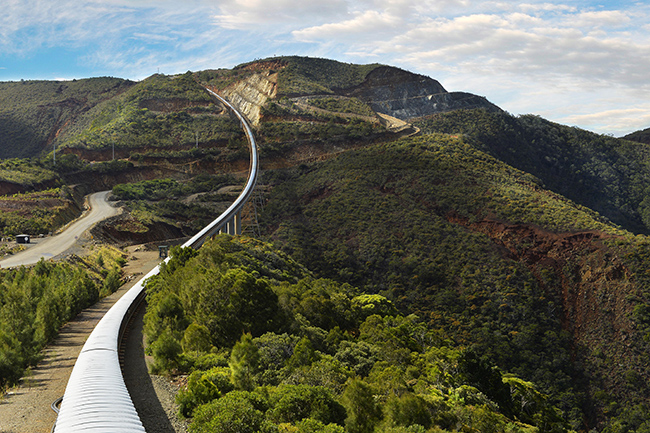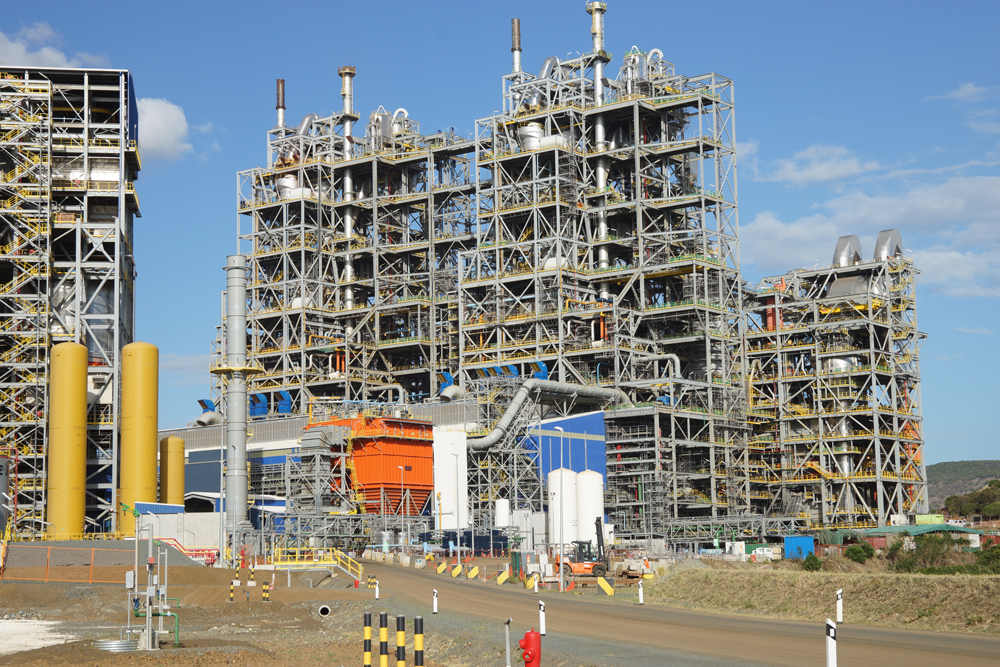Open-pit ore extraction combined with an 11.2 km-long conveyor belt that feeds the pyrometallurgical plant located by the sea. The plant is designed to produce 55,000 tonnes of ferronickel at nominal capacity. The site has a coal-fired power station and a deep-water port.
The KNS Plant and its deposit are located in the Northern Province in the Voh Village, at the Vavouto site. The Koniambo Deposit rises to 902 m and is 20 km long and 5 km wide, with an ore reserve of 62 million tonnes of nickel.
1,387 at 31 December 2023.
Address: Route Territoriale 1, Site de Vavouto – Voh
P.O. Box 679 – 98860 Koné
New Caledonia
Phone: +687 47 45 00
Website : www.koniambonickel.nc
Koniambo Nickel (KNS) manages the construction, the ramp-up and the operation of the 50,000-tonne-per-year of the Northern Metallurgical Plant, as well as mining activities on the Koniambo Deposits located in the Northern Province, between Voh and Koné. The ore extracted from the massif is transported directly to the plant by an 11.2 km-long conveyor belt. The particular configuration of the site makes it an integrated site, with a mine and a plant in a single location.
Koniambo Nickel, whose equity is held by SMSP and Glencore, is governed by a joint management board composed of six members, three of whom are appointed by SMSP and three by Glencore.
On 29 February 2024, Glencore officially announced the sale of its stake in the company and the end of its partnership with SMSP. Koniambo Nickel is awaiting a new shareholder.
The Koniambo massif has been mined intermittently since SLN first extracted high-grade nickel ore in late 1880s. In 1998 Subsequent to the signature of the Bercy Agreement, SMSP was granted the right to develop the Koniambo Deposit.
This Deposit is part of a chain of mountains ranges along the New Caledonia’s West Coast. The Koniambo Massif is 20 km long and 5 km wide. Of this, an area of around 21 km2 displays lateritic mineralisation with high nickel grades.
Exploration work carried out by Xstrata Nickel and SMSP has outlined a mineral resource, defined with a cut-off grade of 2.0% Ni, of more than 150 million tonnes of ore at an average grade of 2.57% Ni.




CONSTRUCTION OF THE PLANT AND ITS START OF PRODUCTION
Construction work began in March 2007, with the preparation of access to the plant site, its supply of services, and the construction of offices and a base camp. The first building blocks modules of the metallurgical plant and the power station were delivered in September 2010.
The Koniambo Nickel joint venture, which operates the industrial site, commissioned the first line of the pyrometallurgical plant to process ore into ferronickel in April 2013. Five months later, the ore preparation unit (OPU) and conveyor came on flow.
In February 2014, the second line went into production and the metallurgical plant was inaugurated in November of the same year.
INDUSTRIAL PROCESS
Ferronickel is produced using a conventional pyrometallurgical process based on a technology developed by Falconbridge’s research and development units, Nickel Smelting Technology (NST). The aim of this innovative technology, which is unique in the world, is to improve energy efficiency and reduce the environmental impact of ferronickel production.
210 megawatts were required particularly to supply the energy needed to smelt the ore at a heat of nearly 1,600 degrees. This is produced by a two-boiler (circulating fluidised bed) 132-megawatt coal-fired power station, with two 40-megawatt gas-fired combustion turbines as back-up units. Fresh water requirements for cooling the facilities are met by reverse osmosis desalination units. A deep-water port has been built to handle the needs of the operation, both for the import of fuels, consumables, equipment and spare parts and for the export of the ferronickel produced.
The sustainable development policy is at the heart of the SMSP Group’s vision, mission and values. It is within this framework that the exceptional wealth represented by Koniambo Nickel is developed.
Koniambo Nickel is not only a driver of economic development, it is an industrial tool to ensure a quality future for generations to come, while respecting local populations and the environment.
Diversity and fairness foster constructive and progressive social relations. They strengthen collective trust and Koniambo Nickel’s commitment to respectful and sustainable social dialogue.
